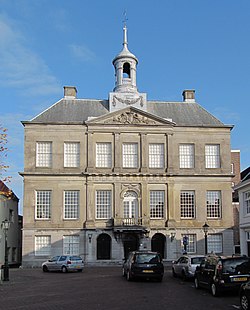1776 in architecture
 From Wikipedia - Reading time: 6 min
From Wikipedia - Reading time: 6 min
This article needs additional citations for verification. (January 2016) |
| List of years in architecture |
|---|
| (table) |
The year 1776 in architecture involved some significant events.
Buildings and structures
[edit]Buildings
[edit]
- The Landhaus (Dresden), designed by Friedrich August Krubsacius, is completed.
- City Hall, Weesp in the Netherlands, designed by Jacob Otten Husly with Leendert Viervant the Younger, is completed.
- Rauma Old Town Hall in Finland, designed by Christian Friedrich Schröder, is built.
- Hôtel du Châtelet town house in Paris, designed by Mathurin Cherpitel, is built.
- Château Malou near Brussels in the Austrian Netherlands is built.
- Curtea Nouă palace in Bucharest, Principality of Wallachia, is completed.
- New Wardour Castle in Wiltshire, England, designed by James Paine, is built to replace the ruined Wardour Castle.
- Woolverstone Hall in Suffolk, England, designed by John Johnson, is built.
- The Wenyuan Chamber, an imperial library in the Forbidden City of Beijing, is built.
- The Palazzi di S. Apollinare in Rome is extended by Pietro Camporese il Vecchio and Pasquale Belli.
- The church of San Barnaba, Venice, is reconstructed by Lorenzo Boschetti.
- The Villa del Poggio Imperiale near Florence in Tuscany is remodelled by Gaspare Paoletti.
- 11–15 Portman Square, London, designed by James Wyatt, are completed.
- The Dobbin House Tavern in Gettysburg, Pennsylvania, is built and is later used as a home on the Underground Railroad.
- New Aray Bridge on Inveraray Castle estate in Scotland, designed by Robert Mylne, is completed.[1]
Births
[edit]- June 8 – Thomas Rickman, English architect and architectural antiquary (died 1841)
- June 11 – James Gillespie Graham, Scottish architect (died 1855)
- August 22 – Carlo Amati, Italian architect (died 1852)
Deaths
[edit]- June 4 – Johann Gottfried Rosenberg, German-Danish rococo architect (born 1709)
References
[edit]- ^ "Inveraray Castle Estate, Aray Bridge". Canmore. Edinburgh: Royal Commission on the Ancient and Historical Monuments of Scotland. 2007. Retrieved 2016-01-24.
Licensed under CC BY-SA 3.0 | Source: https://en.wikipedia.org/wiki/1776_in_architecture41 views | Status: cached on August 13 2025 23:29:05↧ Download as ZWI file
 KSF
KSF